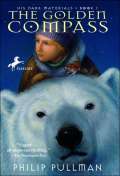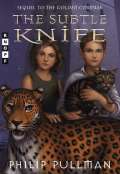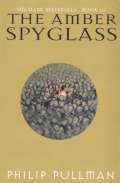 I missed climbing aboard the Harry Potter bandwagon until it had become passé, until the boy wizard was hawking quidditch-themed underwear and even Michael Chabon was getting into the kiddie lit biz. So it was with great eagerness that I plunked down $45 for Philip Pullman’s His Dark Materials trilogy in hopes of getting ahead of the curve.
I missed climbing aboard the Harry Potter bandwagon until it had become passé, until the boy wizard was hawking quidditch-themed underwear and even Michael Chabon was getting into the kiddie lit biz. So it was with great eagerness that I plunked down $45 for Philip Pullman’s His Dark Materials trilogy in hopes of getting ahead of the curve.
The Materials trio is, we’re told, destined for immortality. Narnia status, Lord of the Rings notoriety. Critics have been nearly unanimous in their praise of The Golden Compass, The Subtle Knife and The Amber Spyglass, and the series has accumulated a hip cachet among readers of fantasy and children’s literature. We’re supposed to be rooting for Pullman’s books to overshadow J.K. Rowling’s in much the same way we cheered on Pulp Fiction in its futile quest to snare the 1994 Best Picture Oscar instead of the hopelessly bathetic Forrest Gump.
Oh, was I in for a surprise.
The sad truth is that His Dark Materials is a disappointing mess. For however much one has to admire Pullman for his tenacious imagination and his refusal to pull punches, it’s impossible to overlook the two-dimensional characters, the contrived plotting, the awkwardness of tone. Mr. Pullman, I’ve read J.K. Rowling, and you, sir, are no J.K. Rowling.
Let’s start with the good stuff. Pullman’s books are nobody’s derivatives. There are so many hapless Tolkien and Rowling knockoffs in the marketplace, His Dark Materials earns extra points for refusing to dig through the same ground that’s already been plowed through a thousand times already. No graceful elves, no grumpy dwarves, no cranky wizards. Instead we’re given a child’s-eye perspective of an epic battle between God and Satan — and in this series, at least, it’s Satan we’re meant to sympathize with.
 The one fantastic invention that Pullman’s world gives us is the daemon, a magical companion that’s born with (and spiritually bound to) every human being. Everyone’s daemon is different, and to separate a child from his daemon can be fatal. If nothing else, daemons work strictly as a narrative device, allowing the author to plumb the emotional depths of his characters in novel ways.
The one fantastic invention that Pullman’s world gives us is the daemon, a magical companion that’s born with (and spiritually bound to) every human being. Everyone’s daemon is different, and to separate a child from his daemon can be fatal. If nothing else, daemons work strictly as a narrative device, allowing the author to plumb the emotional depths of his characters in novel ways.
Wouldn’t it be nice if Pullman had chosen to actually plumb some of those depths? He does an admirable job bringing the book’s protagonist Lyra Belaqua to life, but most of the other characters linger in perpetual two-dimensionality. The best Pullman can do with characters like Lee Scoresby and Serafina Pekkalina is to provide them with bits and pieces of an unexplored past. More crucial characters like Asriel and Mrs. Coulter have plenty of motivation provided for them, but these motivations prove to be completely inexplicable. I left the trilogy uncertain of how I was supposed to feel about them, and uninterested in exploring the matter any further.
One finds a similar lack of depth in the world used as a backdrop for His Dark Materials. Like a dream world or a hallucination, Lyra’s seems to have no history. Unlike the worlds of Frank Herbert or J.R.R. Tolkien, which seem to have an internal consistency and logic to them, this world seems like it came into existence — oh, about five minutes before Pullman picked up his pen.
And so we get a bizarre stew of armored polar bears, pixies riding on dragonflies, Tartars, militant angels and armies of witches on broomsticks all lumped together. This isn’t epic fantasy, it’s acid-drenched cartoonery. I half expected H.R. Puffenstuf to make a cameo appearance somewhere. How did all these magical creatures co-exist for thousands of years before the story started? Do the people in this world trade, communicate, create art, culture? The author seems to have either not thought about these things or just simply not cared.
 Many critics (particularly from the right-wing community) have gotten on Pullman’s case about the hardcore atheism and militant anti-Christianity evidenced in these books. I wouldn’t have minded that so much if the author had any clear or consistent points to make about religion. Pullman has said that he views his books as something of a counterpoint to C.S. Lewis’ rather programmatic world of Narnia. But whatever Lewis’s faults as a fantasist — and they are considerable — at least his metaphors were coherent.
Many critics (particularly from the right-wing community) have gotten on Pullman’s case about the hardcore atheism and militant anti-Christianity evidenced in these books. I wouldn’t have minded that so much if the author had any clear or consistent points to make about religion. Pullman has said that he views his books as something of a counterpoint to C.S. Lewis’ rather programmatic world of Narnia. But whatever Lewis’s faults as a fantasist — and they are considerable — at least his metaphors were coherent.
Which leaves me with my last point. His Dark Materials is said to be very rigidly based on Milton’s Paradise Lost, which I have not read. I suppose I could be missing the point of Pullman’s series entirely without having read Milton, and I spent a good bit of the trilogy feeling like someone not in on the joke because of it.
But come to think of it, I had only the foggiest knowledge of the New Testament when I first picked up The Lion, the Witch and the Wardrobe, and I enjoyed those books just fine.
<I’ve never read the series as a whole but just certain excerpts. and from what i can see, the guy has a knack for the melodramatic. and i’m sure that’s alright for young readers but sheesh–what kind of vendetta does he have against god? God must have given him six toes or something!
This view of Pullman’s trilogy is completely naive, I understand every critic has an opinion but to have not even read or looked into Paradise Lost I’m afraid you are defiantly not in on the joke. First you are certainly right that Pullman is no J.K.R because his book contain much more thought and conscious didactism, Harry Potter is clearly a children’s fiction where as His Dark Material can be read on so many levels, many of which you’re missing. The trilogy does not only include God and Satan as you so lamely say but a structured re-working of the bible story of Adam and Eve, it is not that we must sympathize with Satan but take the fact that Adam and Eve eating the forbidden fruit as a positive thing. When they eat this fruit they are exposed to knowledge and Pullman’s suggests this is similar to a child growing from adolescence into an adult, which is represented in Lyra and her daemon who when fixes it’s form at the end of the series represent her coming of age into adulthood. So basically Pullman is saying it is a positive thing to grow up and it should be celebrated rather than deplored. Daemons are certainly more than a narrative device so a character can talk to itself, they are a huge metaphor for puberty and represent a person soul, and when left behind when Lyra enters the underworld they shown the sacrifice she has to make much like Eve when she sacrifices Eden. As for the ‘backdrop’ of Lyra’s world with the exception of the daemons it is our world which has not experienced the Enlightenment period/ the revolution of science, it conveys the effect that a over powering control of the church would have on our society, meaning it would stifle our greater knowledge/technology in order to keep control. The are many clear and consistent point made about religion the main ones that an organised religion has the power to brainwash (so to speak) adults; also represented in the second book where adult cannot be around the spectres as they turn zombie like, these spectres symbolize the control of organised religion and effect they would have on adults. And also that many stereotypically wicked things such as Eve eating the fruit or children losing there innocence are turn into positive things by Pullman because you must remember that Pullman doesn’t write of his own context but instead writes back using 17th to 19th century when children went through a transition from being thought of as wicked to being thought of as pure. If you haven’t read any Blake or Milton or even listen to Pullman in an interview it would be very difficult to come up with an informed view. And Meagan if you haven’t read the books why comment at all? There is no vendetta against God merely the opinions Pullman has on a 17th to 19th century view of religion and childhood. Which if you researched you might agree it was a lot harsher than today’s religious views. – And just to make it clear, I am conveying Pullman’s views (well, what i argue to be Pullman’s views) not my own and would be really interested to know if this has helped your knowledge of the triolgy.
Rachel O: Thanks for the detailed critique. I’ll definitely have to keep this in mind when I decide to give the books another try, which I’ll almost certainly do — they’ve gotten far too much extravagant praise from too many intelligent people for me to ignore them. Hopefully I’ll get more out of them next time. (Though I seriously doubt I’ll have read “Paradise Lost” by then; I really have no interest in Milton).
I think you’re wrong to dismiss J.K. Rowling’s books as “children’s fiction,” though. The Harry Potter series does have a candy-coated surface, but underneath that is a surprising amount of depth.